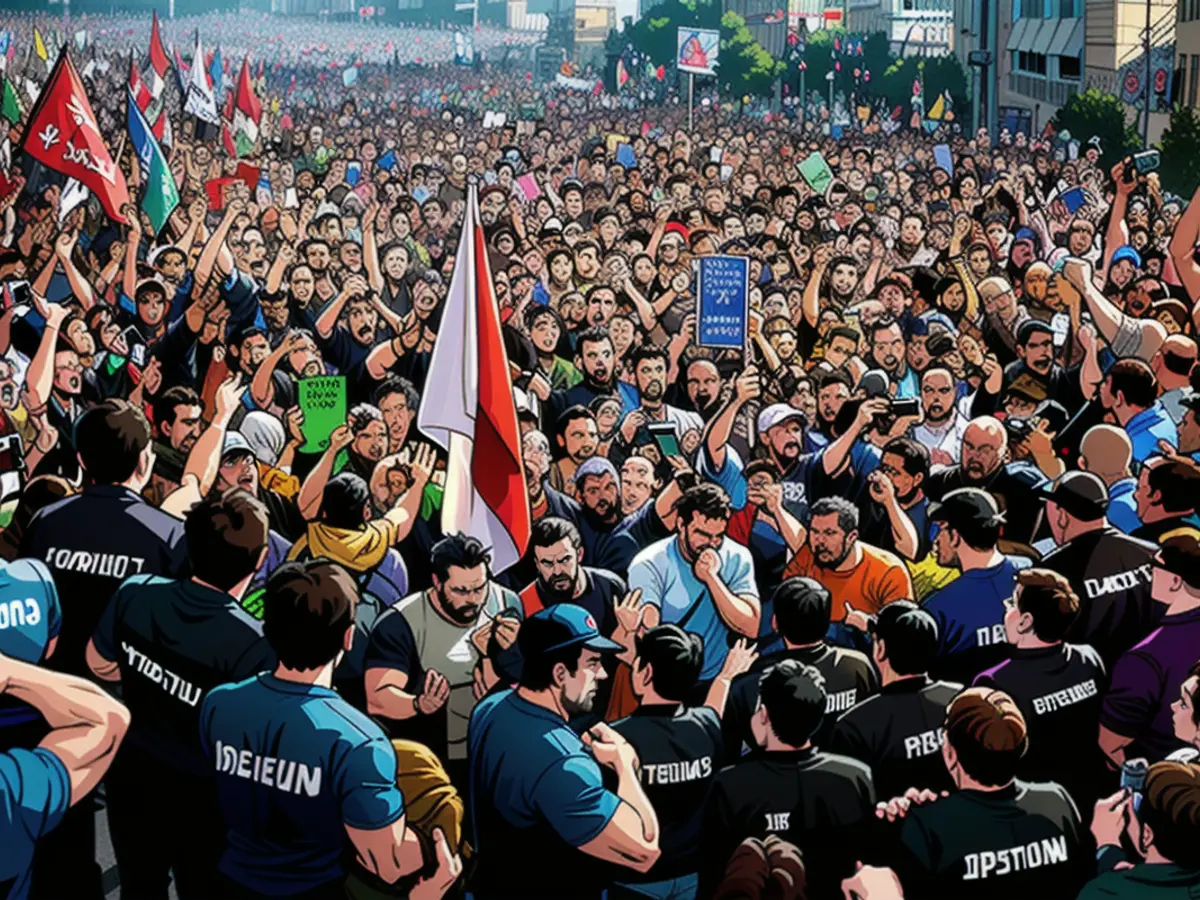Inner conflict reaches a peak in Georgia.
For a while now, there's been strong public backlash against the "agents" law in Georgia, which the government believes would give them more control over the opposition. This week, the final reading of the law is set to take place, and the government is prepared to use force if necessary.
The intensifying conflict between the government and the protest movement in Georgia has reached its peak. During a TV interview, Prime Minister Irakli Kobakhidze of the Georgian Dream party confirmed that they would make sure the controversial "agents" law passes. This Monday, the third and final reading will begin, and the vote is scheduled for Tuesday.
Due to the ongoing mass protests against the bill, Kobakhidze has announced that anyone involved in instigating violence will be prosecuted. According to Interior Minister Vakhtang Gomelauri, blocking important institutions could result in a four-year prison sentence. The government is determined to crack down on any disruptions during the voting process.
The Euro-Atlantic integration candidate, Georgia, is also facing international criticism over the proposed law. The draft requires organizations receiving over 20% of their funding from foreign sources to register as "foreign agents." Critics point out the similarities with a Russian law used to silence the opposition. This draft has been met with strong resistance in Georgia.
With over 20,000 registered NGOs, between 4,500 and 5,000 are active, according to Stephan Malerius, the representative of the CDU-affiliated Konrad Adenauer Foundation in Tbilisi. Malerius believes the investments made by the EU, the US, and other donors in civil society have been beneficial. He emphasized that these investments have been sensible.
The EU and the US have criticized the proposed law, seeing it as a hindrance to Georgia's accession. European Commission President Ursula von der Leyen expressed concern about the country's direction, implying the possibility of sanctions targeting the Georgian Dream party's founder, billionaire Bidzina Ivanishvili, and his associates. In the US, National Security Advisor Jake Sullivan expressed deep concern over "democratic regression."
Tbilisi's government defends the law as a means to enhance transparency and combat "pseudo-liberal values." Ivanishvili, a former Russian businessman and prime minister, argues that the law is necessary to protect Georgia's sovereignty from Western powers. He even went as far as threatening criminal prosecution of the opposition after the upcoming parliamentary elections in October. Ivanishvili accused western powers of trying to drag Georgia into a confrontation with Russia.
The Kremlin has also backed the law. Kremlin spokesman Dmitry Peskov views the law as a tool to prevent external interference in Georgia's domestic affairs. He called the argument that it's a "Russian project" absurd. Since the 2008 war, Russia has controlled the Georgian regions of Abkhazia and South Ossetia, which have declared their independence from Georgia in unrecognized steps.
Malerius, an observer, sees parallels between the current situation in Georgia and recent developments in Russia. He also notes that a new law allows offshore money to flow into Georgia, which could benefit both Ivanishvili and Russian authorities. This suggests that the Georgian law was not solely their idea.
Young people in Georgia are particularly upset about the proposed bill, fearing that their European aspirations are being jeopardized. Leadership within the protests is unclear, but President Salome Zurabishvili is supporting their cause. Other notable figures include labor union workers, athletes, artists, some Orthodox Church clergy, and individual members of the Georgian Dream party.
On Saturday, an estimated 50,000 people gathered in the capital Tbilisi to protest against the law. The government has publicly denounced opposition members, escalating tensions. Opposition nominees have been attacked in recent days, further fueling the demonstrations.
Ivanishvili and Prime Minister Irakli Kobakhidze are confident that they can weather the wave of demonstrations. Nonetheless, it's uncertain whether their government will stay afloat given how quickly the protests are evolving. Georgian Dream is at risk of losing the October parliamentary elections, which were expected to be a secure victory for the party since the opposition is divided. If they repeal the law a second time after 2023, it would be a disappointing outcome for Georgian Dream, says Alexander Atassuntsev from Carnegie Politika. "However, not retracting the law could jeopardize the nation's European prospects and their own authority."
Read also:
- Year of climate records: extreme is the new normal
- Precautionary arrests show Islamist terror threat
- UN vote urges Israel to ceasefire
- SPD rules out budget resolution before the end of the year
- The European Union and the United States have voiced their concerns over the controversial "agents" law in Georgia, expressing worry that it could hinder Georgia's EU accession process.
- Russia, a country known for its own 'agents' law, has shown support for the proposed legislation in Georgia, with Kremlin spokesman Dmitry Peskov dismissing accusations of it being a Russian project.
- Meanwhile, Georgia's opposition, currently organizing demonstrations against the law, has received backing from parliament members, artists, and even the president, with over 50,000 people rallying in Tbilisi over the weekend.
Source: www.ntv.de








